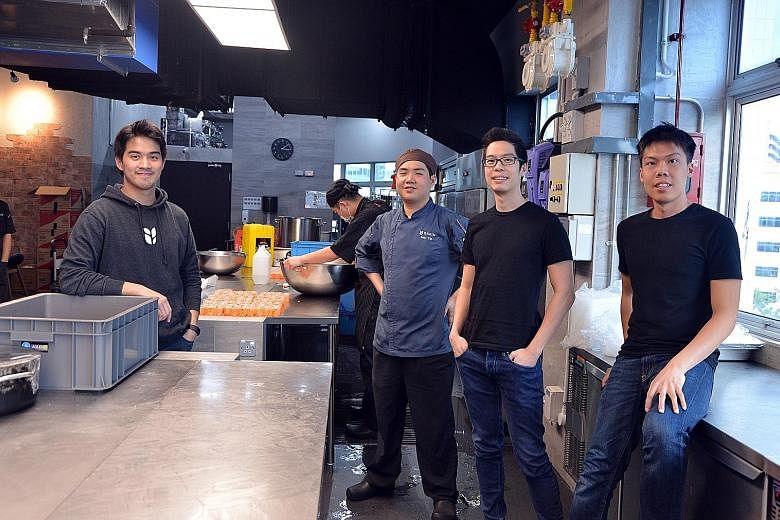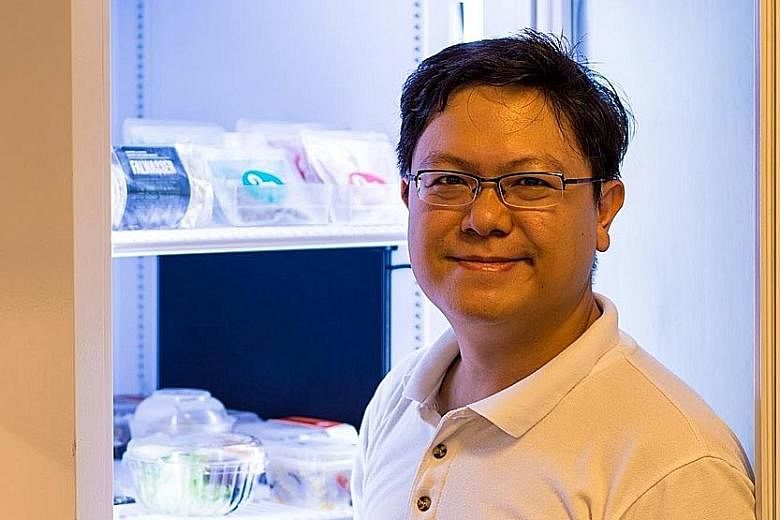There is a new breed of food entrepreneurs looking to conquer Singaporean palates.
They have little to no restaurant expertise and no cooking skills, but they want nothing less than to change the way we eat every day. Their secret weapon? Technology.
Take Grain, a food tech firm started in 2014 that cooks nutritious lunches that customers can order online on weekdays and have delivered to their offices.
It also recently started an events catering business and has applied for a halal certificate.
The start-up was founded by a group of friends with no background in the food industry but a lot of experience in using technology and customer insights to make businesses better.
The company raised $2.45 million within a month from venture capitalist firms in a round of funding last year. In just two years, the firm has grown from an initial team of 10 to 60 today and recently moved to a new office and kitchen space almost 10 times the size of its previous premises to cope with growing demand.
"They saw something in this team which they don't see a lot of in other food companies, which is that the majority of this team have no food experience," said Grain's head of partnerships, Mr Terence Yeo.
"This team is comprised of tech people and ex-consultants. The way we think about the business is very different. "
Indeed, Grain runs its food business in a way that would seem radical, even crazy, in a traditional restaurant. The chefs' bonuses are tied to the daily ratings that customers give their food, a system that also applies to the delivery staff. What gets put on the menu has much less to do with the chefs' specialities than with what customers want.
"Nothing on our menu is accidental," noted co-founder Yong Yi Sung. "The menu encompasses general buckets of preferences and it's a one-stop offering. Nine out of 10 people who land on this page will find something they would want to eat, even as the menu changes."
This week's offerings include assam beef rendang, soya honey glazed salmon and hickory smoked chicken among other dishes, priced between $10.95 and $16.50.
While the chefs are encouraged to flex their creative muscles, meals that receive low feedback are axed from the menu. Grain's chefs, who used to cook at eateries such as Mugaritz in Spain - considered one of the world's top 10 restaurants - and Singapore's Prive, have had a lot of adapting to do.
"Initially they were quite defensive - chefs have a lot of pride in their work. But over time we broke down this barrier and they saw that what they think is tasty might not always have mass appeal," said co-founder Gao Rifeng.
The aim, he said, is to become Singapore's biggest restaurant within the next two years.
"We may not have a storefront but everyone in Singapore can access our food and we could serve everyone in Singapore everyday."
While the team at Grain has to handle everything from buying food ingredients to coding, another food tech entrepreneur is going about it in a more focused fashion, but with no less a lofty ambition.
Mr Darwin Gosal, founder of CryoWerx, has invented a smart vending machine that he believes could change how food is bought and sold in offices and residential neighbourhoods.
The vending machine looks very much like the kind of fridge you would see in a convenience store.
However, it stays locked until a customer downloads the CryoWerx app and uses it to scan a QR code on the vending machine. This unlocks the machine, and the customer can then take out whatever items he wants from it.
And that is it. Thanks to RFID tags on the packaging of the items, the machine automatically knows what has been removed and the cost of the items will then be charged to the customer's credit card, or a mobile wallet within the app.
The machine can hold all kinds of food items, including juice snacks, reheatable soup, salads and sushi bowls, all at the same time. CryoWerx has tied up with a list of companies that are now supplying the food items, including The Soup Spoon, Daily Juice and BoxGreen, which provides healthy snacks.
Food suppliers benefit because they get a new platform for selling their wares to the public without having to open up new branches or hire more manpower, he noted.
For now, Mr Gosal is targeting companies as his main customer base, selling the machine as a healthy addition to the corporate pantry. "Some companies give out FitBit devices to staff to encourage them to lead healthy lifestyles. They could have a similar programme using this machine by subsidising the cost of the healthy food items in it," he said.
CryoWerx is one of several companies here that are introducing Singapore to a new, high-tech breed of vending machines that look set to take over neighbourhood coffee shops.
Just last weekend, a vending machine "cafe" serving hot meals, sandwiches, snacks and drinks round the clock was launched in Sengkang. The latest breed of vending machines can slow-cook food, serve freshly prepared restaurant dishes and even dispense fusion popiah.
This all sounds impressive as it is, but Mr Vishal Harnal, a partner at Silicon Valley-based venture capital firm 500 Startups, said there is a lot more potential to be tapped in the local and regional food market.
In fact, he believes food tech in South-east Asia is only getting started. The big opportunities he sees are in home-grown small food brands as well as in technology- enabled innovative foods, such as alternative sources of protein.
For example, German start-up Your Superfoods makes protein powders made of vegetables, fruits and plants that can be used to make smoothies, juices, salad dressing and the like.
"If you offer high-quality and healthy alternative sources of protein that are also well-priced, you would be able to cater to people who are more health-conscious as well as people who cannot afford meat but want access to proteins," Mr Harnal said. Budding entrepreneurs who want to enter the food space should consider these opportunities. "There's no better time to start a company in South-east Asia. Access to capital has never been easier for entrepreneurs."



